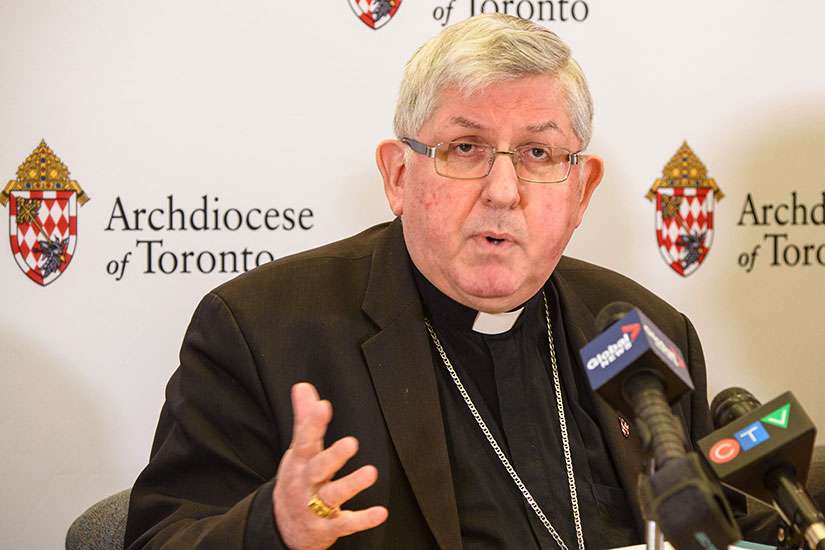“Everybody needs to be welcomed back more fully into the life of the Church,” said Collins in answer to a question about readmitting divorced and remarried Catholics to the Eucharist.
But that welcome isn’t necessarily going to include communion at Mass, Collins said.
The use of the internal forum, a process of examination of conscience involving a priest, and new allowances for bishops to rule on annulments in difficult cases, are a reality for Toronto Catholics but should not be looked at as some end-run around Church teaching about the permanence of marriage, according to Collins.
Globally, the 268-page document on the “Joy of Love: On Love in the Family” has been greeted by Catholics as another example of Pope Francis deft, pastoral and grandfatherly touch in conveying Catholic tradition.
Canadian bishops said they are "deeply thankful" for the document for emphasizing "the importance of marriage and family, for reminding all the faithful of the urgent priority of accompanying families in hope and mercy."
As a married Catholic and mother of four children between the ages of three and 10, Anna Boyagoda, praised the positive image of marriage Pope Francis puts forward in the document.
“It’s something that leads to freedom, to happiness, to a good life,” she said.
Boyagoda said the Pope gives parents a good example of how to convey the faith to their children, “not by simply teaching them moral precepts but by fostering a relationship.”
As a participant in the 2015 Synod on the Family, theologian Moira McQueen said she was “really anxious to see what (the Pope) said.”
“I think it’s truly wonderful that the tone has changed,” McQueen said.
The Pope’s ability to speak plainly, even about complex theological questions, is “truly a gift for all of us – that accessibility.”
Collins warned against a rushed reading of the lengthy document, but encouraged people to read and meditate on the Pope’s teaching bit by bit.
“It’s rooted deeply in sacred Scripture, in the living faith of the Church, but also in individual situations,” said Collins.
Anyone reading the exhortation addressed to “bishops, priests and deacons, consecrated persons, Christian married couples and all the lay faithful” will immediately notice that Scripture is not treated “as a list of rules,” said Collins.
Nor is the Pope stuck in some idealized past, but concretely addresses the real challenges families face from war and famine to a culture and an economic order that encourages individualism divorced from the family. Collins was quick to note how Pope Francis “speaks very distinctly to euthanasia.”
Collins’ first reading of Amoris Laetitia, as the document is known in Latin, reminded him over and over of the virtue of prudence – which he defined in terms of deep understanding of both Church teaching and concrete, individual situations “rather than simply, mechanically imposed rules.”
St. Augustine’s Seminary theologian Josephine Lombardi said she was grateful for the attention Pope Francis gives to the formation of couples for marriage, both before and after vows are exchanged.
“For the priesthood men may spend five to 10 years (on formation). Married couples get one weekend,” she said. “Couples need our help.”
Unsurprisingly in the Year of Mercy, Lombardi found the theme of mercy spread throughout the document.
“He’s so merciful and so understanding of the issues these people face,” she said.
As a female, lay theologian involved in forming the next generation of priests, Lombardi said she was appreciative of how Pope Francis affirmed and encouraged her in her role.

